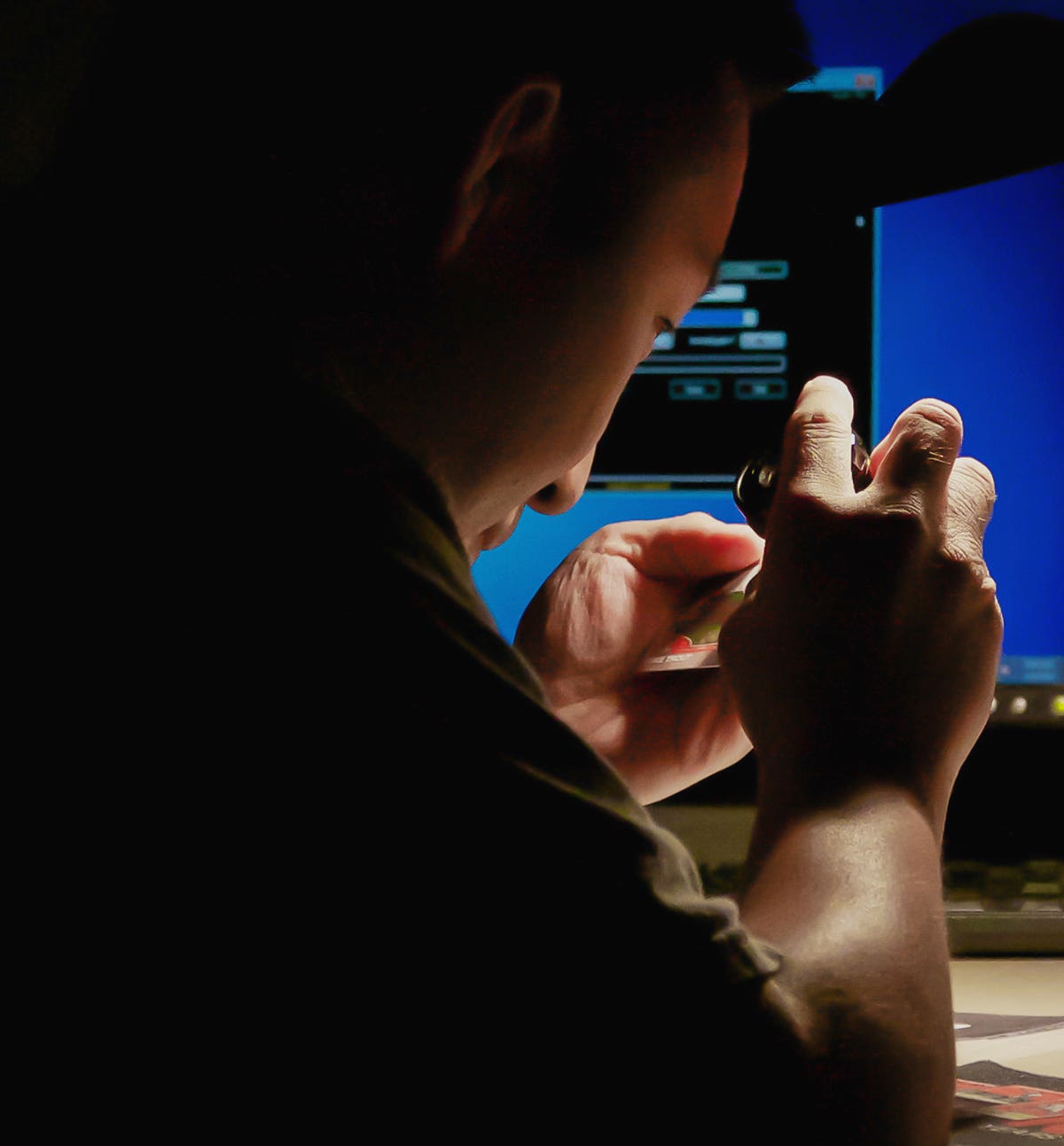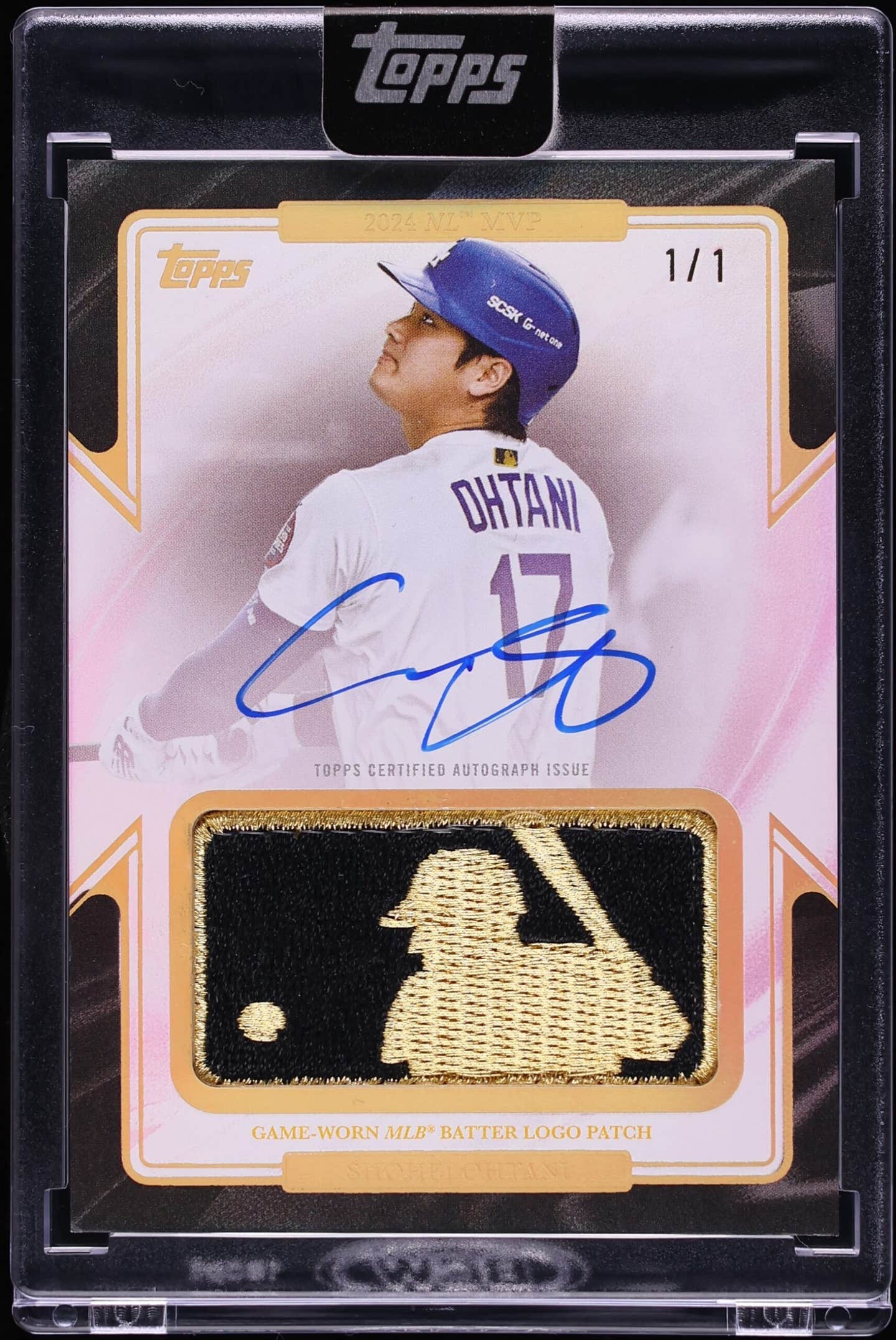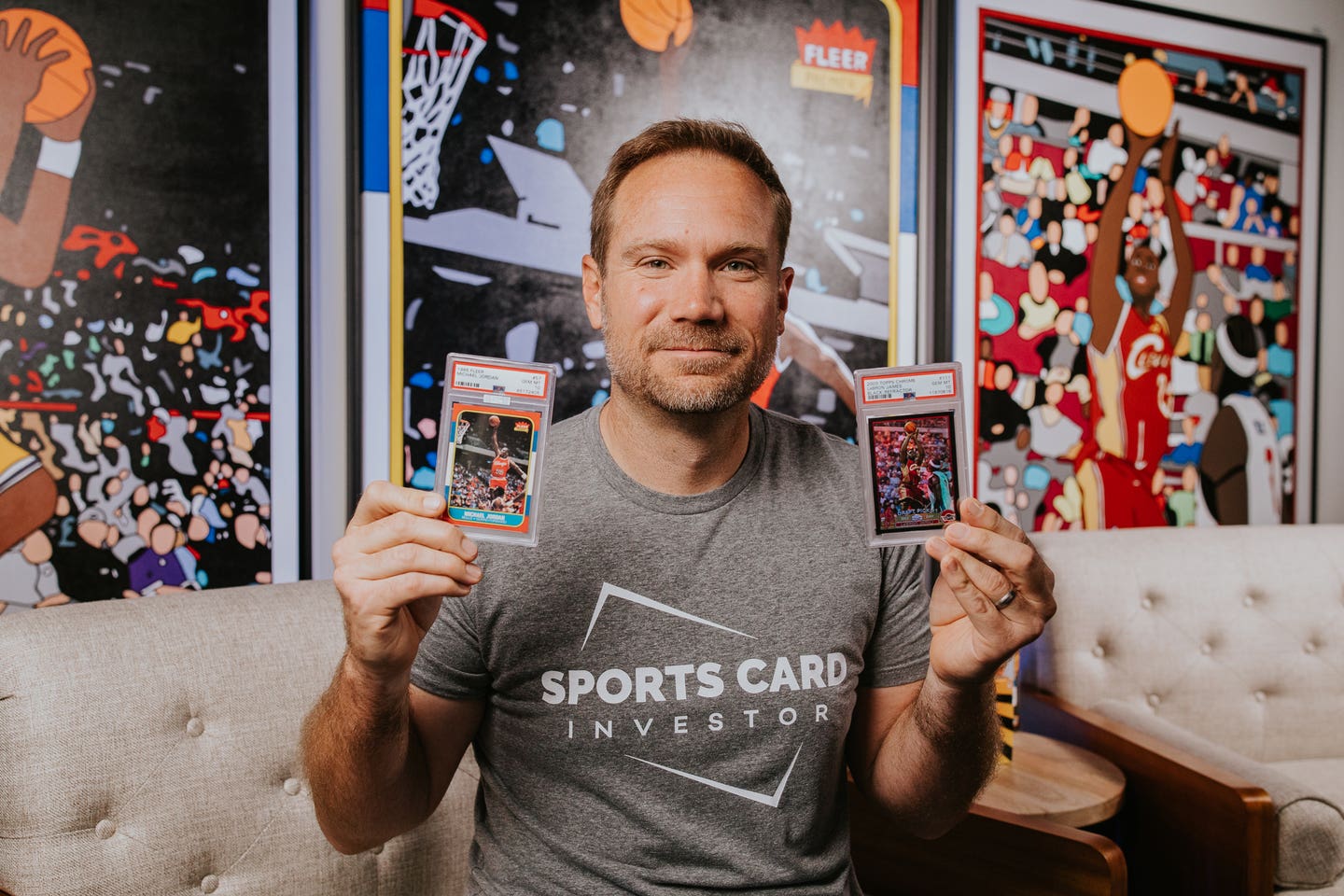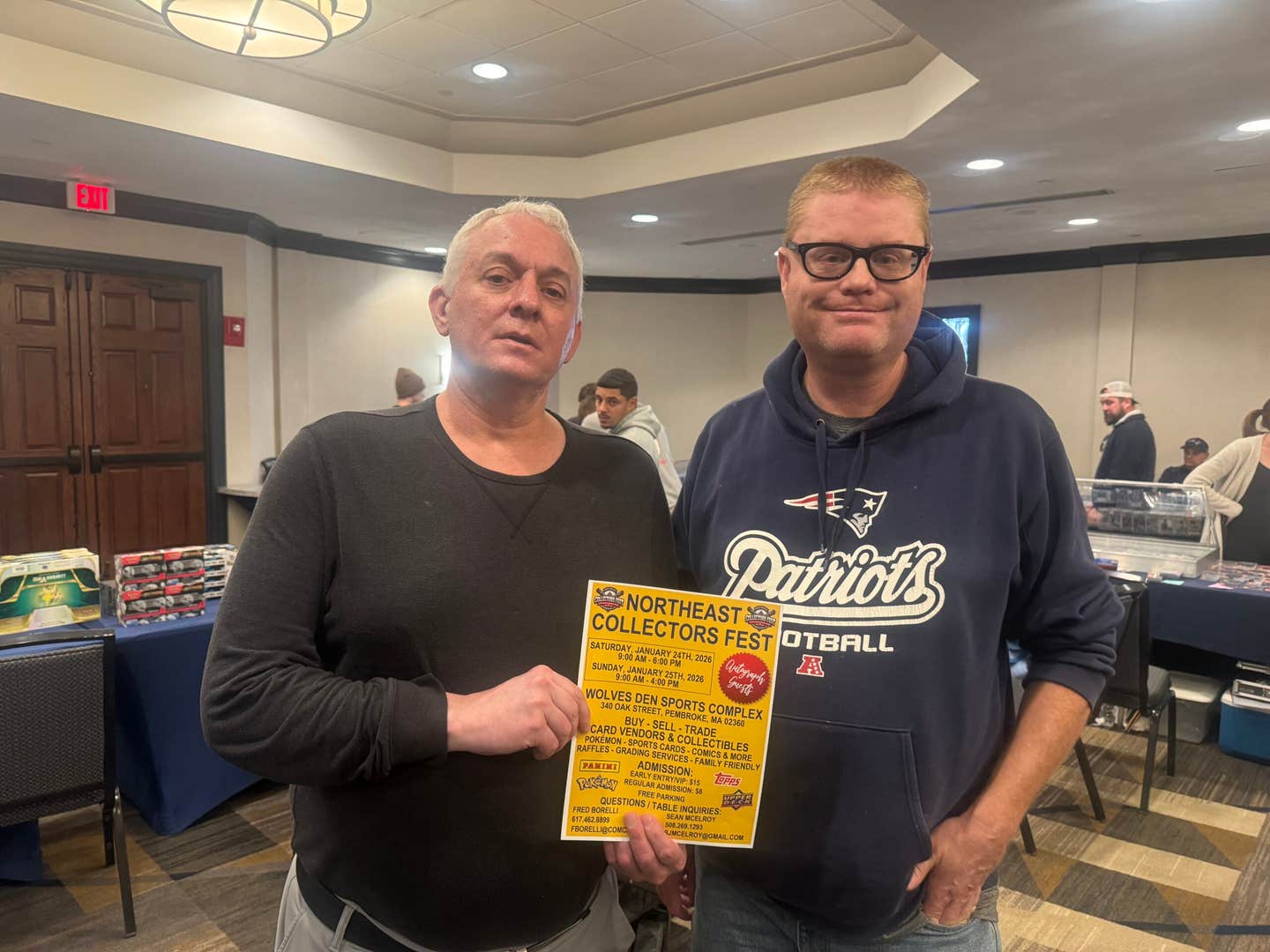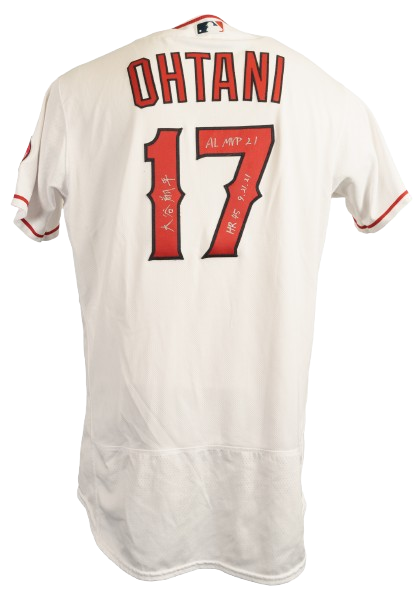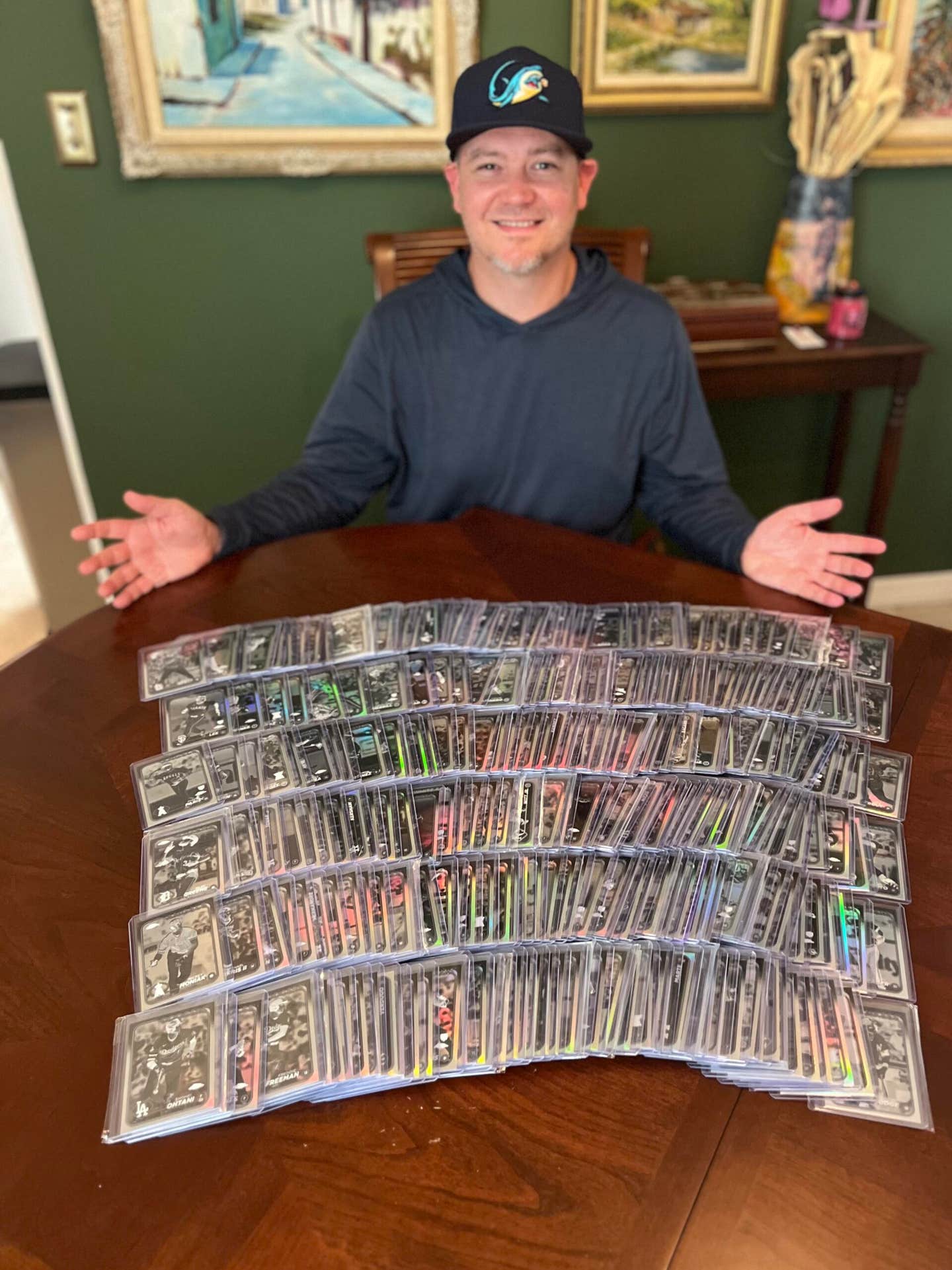Collecting 101
Battling Davis still ‘Hitting From the Heart’
Had a bad day at the office the last week. Missed a deadline, screwed up a project I had been working on for months with the blunder almost costing me the job I love. Then I got home and found out my house had been broken into, with many of my prized (not to mention, uninsured) collectibles now MIA.
As I assessed all of the damage my day from hell had bestowed upon me, I wondered aloud, "why is all of this *%!* happening to me!" My initial tirade was followed up with several hours of self pity, as I contemplated what I had done to deserve this cruel fate.
The woe-is-me whining continued for hours, as I shared my story with some friends and family. They all did their best to console me and put my mind at ease, with each focused on providing the perfect anecdote for what was ailing me. "Well you know, it could be worse," they said. "Cheer up."
And that's when it hit me. Yeah, it definitely could have been worse.
In fact, there are an infinite number of ways it could have been worse.
Racing thoughts of a starving child in a third-world country or anyone living in a war-torn area quickly put my string of bad luck into the proper perspective. A chat with a recent acquaintance helped me quickly realized that while I was definitely having a bad stretch, there were many others out there who had it far worse. It also helped me understand that what I do have, no matter the contents, should actually be viewed as blessing and treasured with all of my heart.
The acquaintance with the great approach to life's many challenges was none other than former major league All-Star Eric Davis, and I'm not embarrassed to say I learned quite a bit about staying positive during the brief time we spoke.
Anyone who follows the game of baseball remembers the lanky, do-it-all slugger who burst onto the MLB scene with the Cincinnati Reds in the mid-80s and early '90s. Davis was one of the guys who helped popularize the term "five-tool player," with many in the game touting him as the next Willie Mays before a rash of injuries and a battle with colon cancer ended his Hall-of-Fame quality career.
And while comparing his situation with mine would be the ultimate apples and oranges discussion, the attitude he embraced back in 1998 when he was initially diagnosed and continues to embrace today, can't do anything but help no matter the situation it's applied to.
The following exclusive interview is Davis reflecting on his childhood, life after baseball, the steroid issue, injuries and insults and everything in between.
Collectibles Industry
"In the early 80s it wasn't a lot of marketing dollars out there, especially in baseball. You really didn't do a lot of commercials and things of that nature so the only other source of income at that particular time was to capitalize on your status in that particular sport. It wasn't so much the memorabilia per se, but the actual autographing itself. Everybody did, it was the thing to do. I watched it digress over the years for whatever reason. Because of a lot of different collectors and how they were using the autographs and so forth and so on, it digressed quite a bit."
Personal Policy
"I've always signed for the kids and I will continue to do that. I just haven't done many shows like I did early on. I can remember one off-season where I was doing it every couple weeks. You were in some major metropolitan city doing it but as you got older and wiser to how much advantage people were taken of you, I decided to minimize it a whole lot."
Signing
"I do a lot of private signings. They'll bring me the stuff and I'll sign it, but I really don't do a lot of shows."
Strange Requests
"A woman's breast is probably the strangest thing. I've signed back sides, I've signed stomachs, I've signed breasts. I've signed babies, I've signed it all."
Collecting as a Kid
"Baseball cards for me as a kid growing up in South Central (L.A.), the only good thing about them for me was the bubble gum. Baseball was a popular sport but you didn't really identify with it media-wise or television-wise because the games really weren't televised like they are now. My main source was Vin Scully. You didn't really watch a lot of games on TV. I'm sure the Dodgers here in L.A. were one of the biggest draws so we would get a lot of spring training and regular season Dodgers games but it wasn't like it is now where you have a national network showing other teams outside of the NBC Game of the Week on Saturday.
Normally as kid growing up in Southern California you weren't sitting in the house watching baseball in the summer time. You were out on the football field, playing basketball or baseball or something. Unless it was raining, that was about the only time we ever watched it."
Industry Experiences in MLB
"That was the only way for you to find out. You didn't really know about signing autographs and stuff like that when you were a kid because that stuff was never brought to you. Especially any inner-city around the country, they just didn't do that. There were no shows coming to South Central (L.A.). We couldn't afford to pay $5 or $10 for an autograph anyway so it wasn't really that big of a deal to us."
Prized Possessions
"I don't really treasure any of the stuff I have saved from my career because it's all materialistic stuff. All of my treasures are in my mind, you know what I mean? So I don't need a jersey to validate what I did. I'm blessed to have them and display them in my home but it's nothing to be treasured. It's just a piece of material. I don't really get into a those type of things because my stuff is kind of spread around.
My Gold Gloves and my Silver bats are at my mother's house, my father's house, and one is at one of my stores, you know what I'm saying? It doesn't really fascinate me much. It's more for other people to be fascinated by it. When you can have the ability to win some awards and be able to display some things it's more for them. I don't walk around my house and look at my trophy case.
I think the most gratifying award I have is the Roberto Clemente Award because of what he stood for and how that all came to fruition with me being diagnosed with cancer and coming back and doing the things that I did. If any of them have more sentimental value than others it would be the awards I received after being diagnosed with cancer in 1987."
Photo Shoots
"After a while, it became a drag. It was fine when they would come by and you'd get your little $130 from Topps or whoever. When you did it, you really did it as a goof. In spring training, all of the trading card companies would be down there and you'd get there at 7:30 in the morning and you would end up walking down the line for more than an hour and it got monotonous. 'Hold the bat this way,' 'Stand this way,' 'Look this way."
You almost felt like a piece of meat.
Anything you do in the initial stages of your career is exciting because you've never done it before but after you've done it and see that this is part of the protocol, and this is what I have to do to get down to my business and do what I have to do to get ready to play.
But it gives you the chance to meet a lot of interesting people and I have become friends with a lot of the photographers and people like that and they would send me pictures when they saw me in their city so it was cool."
First Card
"Even in the minor leagues you had cards so I guess the biggest shock you would get was in A-ball when you got your card with your picture on it and your stats on the back. I still have one of each card ever made of me, so I still do have that.
After a while it was every company out there doing there own bubble gum ca rd for whatever reason and the market became stagnated."
Bond with the Fans
"Absolutely, that's what makes it all worth the while. The relationships with the fans is what it's all about. Some of them are (expletive deleted), and that's the hard part. When I do my signings I try not to let a few bad apples spoil it for everyone. I never just sign with my head down and not speak to the fans. If that's the kind of attitude guys are going to have going into a signing, then don't do it. I look at it from a different perspective. I look at it like that yeah, somebody is making money off of you and you're getting paid to do it, but for the people standing in line, there's a little more to it than that.
There's a few people who do it religiously and vigorously and people who use their children to do it and those are the people I have a problem with. People get upset with me because I remember them. Especially when I'm at the ballpark. I'll go out and I'll sign and a guy will get in line, and that's why I always look at them. Because then that same guy will come back and I'll say, 'Didn't I just sign something for you?' 'Well this is for my friend.' And I'll say OK, where is he? 'Well he's not here.' Well, then you should stop is what I'll tell them.
You cannot explain to a 3-year-old kid why you're not going to sign the stack of cards they got because those are not their cards. So that's the down side to all of that. Interacting with the actual fans is still fun for me though and that's why I do it."
What Might Have Been
"I don't look at like 'what if?' Because it is was it is. If you look at my numbers per at-bat, they're just as good as anybody. As far as my totals with the amount of at-bats that I had, they're Hall-of-Fame numbers but I know had I not missed almost 41/2 years, based on where I was going, I would have had 500 home runs. I would have 500 stolen bases, which nobody had ever done before.
(Davis became eligible for Hall-of-Fame consideration in 2006) But that doesn't drive me, it never did, because I know what kind of player I was and people who played with me and against me knew what type of player I was. There was not anybody who has ever donned a uniform that could do more than what I did. I know that, and everybody who played the game knows that.
Injuries, you can't control them. I think it's destiny for some people to do this and some people to do that. I think it's destiny that some people have a limited amount of injuries compared to other people. I never got hurt mowing the lawn and I've never got hurt stepping out of the car. I've always gotten hurt between the lines, ya know? The way I played the game, I wouldn't sacrifice that for my teammates one bit. Because I've always gotten hurt playing defense. I always got hurt hurt diving for a ball or running into a wall. Tearing my kidney in the World Series, which cost me a year and a half, cancer. I mean I missed games for major things like that. It's not like I missed games because I was goofing around riding a motorcycle.
I don't want to say that with the way I played I was destined to get injured but it was also the time I played. At the time I played there was no padding on the walls. What is there one stadium with artificial surface in the league right now? I had bone chips in my ankles from playing on the turf, diving into the wall where there was no padding. It was more the era than anything else.
If I'm playing today, I probably don't get those injuries. It is what it is. You can't reflect back and wonder what might have been. That's sour grapes to me and I think people who do that are jealous for whatever reason. Whether it's because they're making more money now or more notoriety because they're gonna pass your record or something. Who cares?"
Changed Perspective
"People always ask me, 'How did your life change after the cancer?' I tell them my life didn't really change because my life wasn't really messed up before the cancer. I wasn't down in the dumps or belligerent or anything like that where all of a sudden I had to make a 90-degree angle because I was diagnosed with cancer. I believed in God before that and I lived my life the same way before that. I was a basic person who enjoyed his life before that and I'm enjoying my life after."
Finding Inspiration
"I think what helped me a whole lot during all that was when I was taking chemo. I would visit a lot of different hospitals and I would go to the children's ward and see how many children in there that were 4, 5, 6, 7 or 8 years old who never had an opportunity to really be a kid. I mean, I was 37 years old, I had lived 37 years. These kids were 5 and never had the chance to do the things children are all supposed to do. When I saw the smiles on their faces and the energy that they were displaying I had to ask myself, 'How can I not have any energy when I've done a whole lot? How could I be mad at anything that was happening to me when here you have a bunch of children who haven't even had the opportunity to do anything and they're not mad?' That was my motivation. That was my inspiration."
Why Me?
"I would always ask myself, 'Why not you? Why does it have to be somebody else all of the time?' And that was something that people could never explain or didn't want to. My thoughts are, trials and tribulations are going to affect every family, some sooner, some later. But the amount of people that you have in your family will be the amount of trials and tribulations that you have in your life. Because if you're born, you're surely gonna die. It's just a matter of when, where and how? And everybody around you is eventually going to leave you. Some families have tragedies at an early age and some have them at an older age, but you're going to have it. It's just a matter of when. So I never looked at it like, 'Why me.?' Why not me? I felt like it happened to me for a reason. It spread the word to people that it can happen to a 37-year-old man who was in so-called 'perfect' condition."
Tough Teams and Tough Pitchers
"You look at some of the great teams the Mets had if you came out of a four-game series and came out of there going 4-for-20, you were happy. You face Doc at his peak, you face Frank Viola, Sid Fernandez. I mean David Cone, Rick Aguilera, Bob Ojeda was a starter. They would come at you continuously. I mean Ron Darling, they had some guys who if you weren't ready, things weren't going to prosper in your behalf. You went into the dome and they had Nolan Ryan and Mike Scott at that time. You went out to Dodger Stadium and they had Fernando, Alejandro Pena, Orel Hersheiser. You went into some real tough places to hit but that was the joy, the competition. You had to focus every night. There were no easy nights. Every once in a while you'd face a guy who was struggling, but those days were few and far between."
Student of the Game
"Film, back when I came into the league there wasn't any film. You had to think, you had to memorize that kind of stuff. And that what was good about the game, you had to think. There are a lot of guys out there today that don't know how to think up there. They don't end up getting anything out of their own instincts because everything is given to them.
You'd be surprised at how many guys just go up there hacking, looking for a particular pitch and that's it. You have to learn patience, make adjustments, know when to be aggressive and know what they're trying to do to you and then do what's best to help your club. I knew when to be disciplined but I also knew that in order for us to win this is what I had to do. I knew that sometimes I had to expand my strike zone and drive in a run so that's what I would do. It didn't work all of the time but most times, I got it done."
Power vs. Average
"I could have hit for a lot higher average if I didn't take more chances. I took more chances to hit .280 where I could take the walk and hit .315. But when you know your the franchise and you're the man, that was my job to take more chances and go outside the strike zone with the game on the line and do something with it. I walked like 90-100 times a year but I could have done that and hit .320. It all goes back to knowing your role and knowing what you have around you in the lineup."
One of a Kind
"There hasn't been a center fielder in I don't know how long, to hit 30 HR, steal 50 and win a Gold Glove in the same year.
The only one that I can think of that is doing things like that is Jim Edmonds but he didn't steal the bases. I patterned my game after Andre Dawson back when he was with Montreal because he was the only center fielder doing what I liked to do."
Risk Taker
"I didn't consider jumping into a wall or diving for a ball taking a chance, I was a baseball player and that's just what you do. If I have a unique ability, I'm going to hit a single and then try and steal second and third. I didn't think about am I going to get hurt or am I going to be tired in September? I played the game the way I knew how to play the game. There is no right and wrong way to play. I just happened to be the fastest guy on the team and the guy with the most power so I had to run. It wasn't until later in my career that I realized they didn't appreciate the stolen bases like they did the home runs."
Changing the Game
We were in Atlanta and Chuck Tanner was managing the Braves. The night before, I think I stole four bases against Atlanta. The next night, I get a hit and steal second. Chuck Tanner had Glenn Hubbard hold me on second like I was at first base because they were so in fear of me stealing third.
Nowadays, the game is so scientific. They're were all about the pitcher's delivery to the plate, the pitcher's time, the catcher's release time. I didn't worry about none of that. If I got my lead and my jump, it didn't matter, I would get there in 2.7, 2.8 seconds. The quickest pitcher is 1.3. The quickest catcher is 1.9, that's 3.1. There was nothing they could do. They could slide step until there leg falls off, it didn't matter. If a guy can run, he can steal a base so let him go. The art to stealing bases is confidence, just like anything. The more you run, the more comfortable you're going to be when you run.
Steroids
"I didn't know of anybody who even talked about steroids. The steroid talk didn't start until you started to see certain people come back from the offseason and would see some major changes in their body. People would say, 'Oh, he must have done this, or he must being doing that.' But I believe it has all been blown out of proportion and I don't mean to sound facetious when I say this, but because of the fact that we're talking about what a guy did to enhance his body. There is nothing, to my knowledge, that you can do to enhance your body without taking something. You just don't have enough time. You can go into the weight room every single day and No. 1, you can't really even do that because your body needs time to recover. So anybody, whether it's Creatine or a powdered shake or whatever, you have to take something.
If guys wanted to take that chance, that's there business. I don't believe taking steroids is going to enhance your ability to hit. And if you're talking about any specific individual like Barry (Bonds), you have to also remember that it wasn't even illegal at the time. I think people are missing the whole irony about talking about Bonds and that he's a cheater and they need to put an asterisk by his name in the record books. How many people are in the Hall of Fame who scuffed a baseball? And these are people who have been caught and admitted to scuffing the baseball. They were caught cheating and that's OK? Cheating is cheating. One shouldn't be magnified more than the other.
And last, and most importantly, Davis discussed how he's doing heath-wise.
Health
"I'm good, I'm here. That's the most important thing that I woke up this morning and I'm here."
Bad day or no bad day, seems like some pretty sound advice to me.



